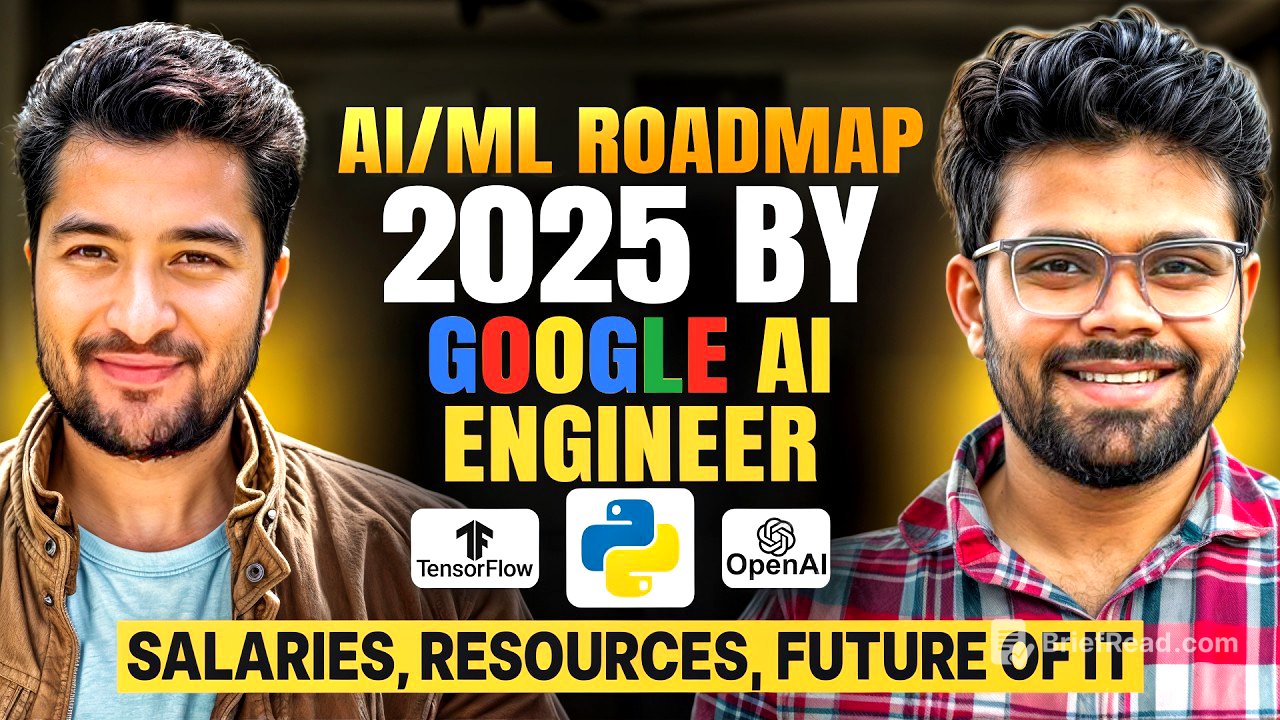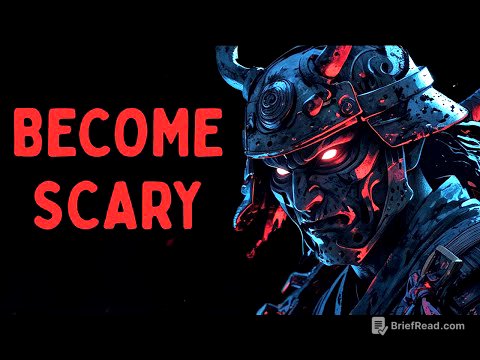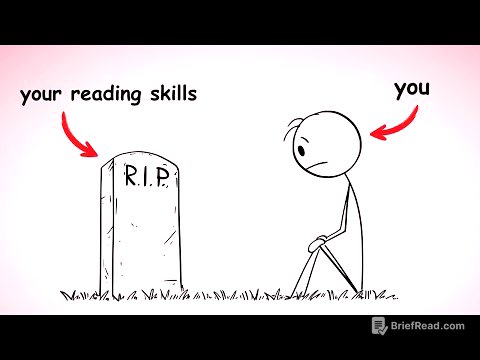TLDR;
This podcast episode features a discussion with Gopala Dhar, an AI engineer at Google, about the evolving landscape of AI and its impact on various professions. They discuss the roles of AI/ML engineers, the potential for AI to replace jobs, and how individuals from diverse backgrounds can pursue a career in AI. Gopala shares insights on required skills, salaries, learning roadmaps, and the future of AI, offering valuable advice for both freshers and experienced professionals looking to transition into the field.
- AI will assist, not replace, jobs, especially for those who learn to use it effectively.
- A career in AI is promising due to increasing demand and investment by companies.
- Curiosity and continuous learning are crucial for success in the rapidly evolving AI domain.
Podcast Intro [2:40]
The host, Fraz, introduces the podcast topic, which revolves around the changes in the job market due to AI. There's a common concern that AI might replace software engineers and other professionals. The podcast aims to provide clarity on these concerns by inviting an AI engineer to share his insights.
Induction About the Guest [3:12]
Fraz introduces Gopala Dhar, an AI engineer at Google with about 4-5 years of experience in the field. Gopala will share his expertise and address common questions about AI and ML engineering.
What is an AI and ML Engineer [4:17]
Gopala explains the difference between AI and ML engineers. ML engineering is a subset of AI engineering, focusing more on machine learning and deep learning algorithms. AI engineering includes generative AI and building data pipelines, making it a broader role.
Will AI Replace the Jobs of Software Engineers [5:16]
Gopala believes AI will not replace jobs entirely. Instead, professionals who know how to use AI effectively will be more efficient and may handle tasks previously done by multiple people. The key is to adapt and learn how to leverage AI tools.
What Kind of Jobs are Actually Getting Replaced by AI [6:20]
AI is enhancing efficiency in fields like content creation, where small teams using AI tools can manage workflows that previously required larger teams. Human capital needs to become more efficient by integrating AI tools effectively.
How is AI as a Career Option [7:02]
Gopala considers AI a phenomenal career option due to increasing demand and investment in AI across various companies. Opportunities in AI engineering, program management, and product management are expected to grow significantly.
Salaries of AI / ML Engineers, both Freshers and Experienced [8:22]
In India, freshers in AI/ML can expect a starting salary of around 8-10 LPA. With 3-4 years of experience, this can increase to 25-35 LPA. In the US, starting salaries are around $80,000-$100,000, potentially rising to $200,000 with a few years of experience.
How to Decide if One Should Choose AI as a Career [11:30]
Gopala advises that curiosity is key. If you're naturally curious about AI and machine learning, spend time learning about it. Experiment and explore different areas within AI to determine where your interests lie, such as AI engineering, ML engineering, ML Ops, or AI product management.
Can a BCA or BSc Student Become an AI Engineer [12:30]
Gopala believes that students from BCA or BSc backgrounds can become AI/ML engineers if they have clear fundamentals and are willing to upskill. Focus on mathematics, probability, statistics, and algorithms. It's not uncommon for people with non-traditional backgrounds to succeed in AI/ML.
Can Someone from a Different Profession Become an AI Engineer [13:35]
Gopala shares an example of doctors who transitioned into AI/ML by building a chatbot startup. With enough conviction, curiosity, and even obsession, people from different professions can successfully switch to AI engineering.
Can Someone with Poor Maths Become an AI Engineer [14:36]
While mathematics is important, weak math skills shouldn't discourage someone from pursuing AI. Effort and practice can improve understanding. A solid grasp of statistics and probability is beneficial for advanced algorithms.
AI Roles with No Coding [15:50]
AI product managers often don't require coding skills, especially if their AI knowledge is strong. Other roles include AI prompt designers. While programming knowledge is helpful, it's not always essential for these roles.
How will AI Change the World in the Next 5 Years [17:00]
Gopala predicts that AI will become more common, changing how we use the internet. Quantum AI might emerge, enabling faster training of large models. These advancements are currently theoretical but are being actively researched.
Interview Questions in AI and ML roles [18:15]
AI/ML interviews typically cover statistics, mathematics, and data structures and algorithms (DSA). System design is also important for senior roles. A high-level understanding of equations and strong coding skills are expected.
AI / ML Roadmap with Timeline [22:19]
For someone starting from scratch, Gopala recommends beginning with mathematics and statistics fundamentals. The Google Machine Learning Crash Course is a great free resource. After that, start building simple projects with scikit-learn and explore deep learning with PyTorch or TensorFlow. Learning generative AI frameworks like LangChain and ADK is also beneficial. Covering these basics can take 3-6 months, while in-depth understanding and application development may take over a year.
Programming Language and Frameworks [23:09]
Python is highly recommended as the primary programming language. For machine learning, start with scikit-learn. For deep learning, PyTorch and TensorFlow are good choices. For generative AI, explore LangChain, LlamaIndex, and ADK.
Projects in AI and ML to Impress Interviewers [24:33]
Gopala suggests incorporating generative AI into projects. Building a multi-agent system that calls APIs and makes decisions can be impressive. Integrating an actual ML model, such as churn prediction or classification, showcases a holistic understanding of ML and modern AI tools.
Platforms to Practice AI / ML Skills [25:20]
Google Colab is a great platform for building AI projects, offering free GPU and TPU resources for training and tuning models. Tuning models with custom datasets can make a significant impact.
What Level of DSA is Asked in AI Interviews [26:08]
While very hard DSA questions are generally not asked, knowing LeetCode Easy and Medium is essential. The difficulty level may vary depending on the role and seniority.
How to Get an Internship in AI / ML [27:10]
Creating good projects and sharing them on LinkedIn can help attract attention. Interacting with people and showcasing new, innovative work in generative AI can be very beneficial. Clear understanding of fundamental concepts is crucial for clearing interviews.
Companies that Hire for AI / ML Profiles [28:18]
Almost all companies are now hiring for AI/ML roles. Traditional companies like Qualify Analytics, Tiger Analytics, and Fractal also hire for these roles. Even media and healthcare companies are seeking AI engineers, prompt engineers, and AI designers.
Final Advice for Learners [29:38]
Gopala advises staying up-to-date with the latest developments in the rapidly evolving AI domain. An open and learning mindset is crucial for a fulfilling career in AI, as new things emerge constantly. Being comfortable and happy with continuous learning is key to success in this field.









